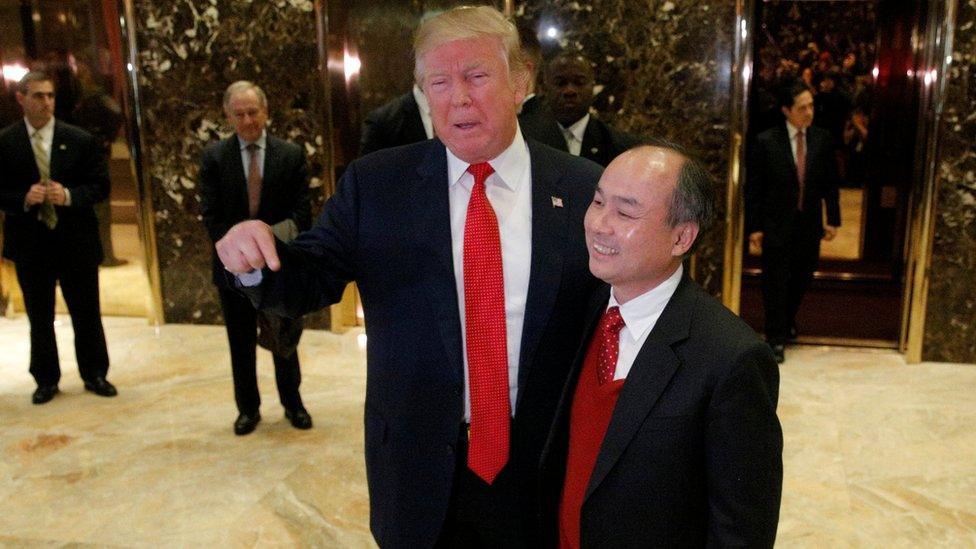Why is Softbank investing in the US now?
- Published

The two billionaires couldn't have looked more at ease with one another, as they announced the investment from Japan's Softbank into US start-ups.
Arms around each other, beaming from ear to ear - check out the video here: Japan's Softbank chief meets with US President-elect, external.
But why is Masayoshi Son, one of Japan's most eccentric businessmen, investing in Trump's America at a time when the US is seemingly focusing less on Asia?
Here are three reasons:
Betting the farm on Sprint:
Softbank paid $22bn (£17.3bn) for a controlling stake in US telecoms firm Sprint in 2013, which was the number 3 operator at that time. But that investment has lost around $7bn of its value largely because Sprint lost ground against its competitors.
One of the ways Softbank had hoped to claw back a profit was by buying T-Mobile, Sprint's main competition in the States. But that deal took a backseat after US regulators signalled they weren't in favour.
Cosying up to the new US president by doing a deal that makes him look good would be one way to smoothe those regulatory issues in the future.
Exposure to US tech firms:
Japan isn't really the centre of innovation and technology as it once was, Marc Einstein at Frost & Sullivan tells me. He covers the sector from Tokyo, and as he put it, "Japan has really fallen behind on tech".
So being in the US and having a foothold in the sector would give Masayoshi Son access to Silicon Valley, and more importantly, what people there are thinking and doing and what the future of IoT (Internet of Things) looks like.
Billionaire buddies:
The camaraderie between the two men is hard to miss - just look at that video again if you need convincing. "They're both billionaires, they're both mavericks and they're both gamblers," says Mr Einstein.
"I can see them sitting down and having a positive discussion." According to Mr Einstein the two are likely to share a good rapport - and that means they "understand one another and speak each other's language" - which perhaps suggests both sides understand what a good deal means.
The Son Seal of credibility for Trump?
The $50bn that Masayoshi Son has bet on the new relationship with the president-elect isn't small change by any account. Creating 50,000 jobs is also no small feat to achieve.
Having said that, the $50bn is coming from a previously announced $100bn Saudi venture - that was created before the election - so some would argue this was money that was coming the US's way in any case.
But Mr Trump has rushed to claim this as his victory.
The Japanese business leader's investment will no doubt be used as evidence by the Trump team that even as it pulls out of global trade deals like the Trans Pacific Partnership, the US is open for business - and that companies like Softbank are breaking down the door to get in.
- Published22 November 2016
- Published10 November 2016
- Published7 November 2016